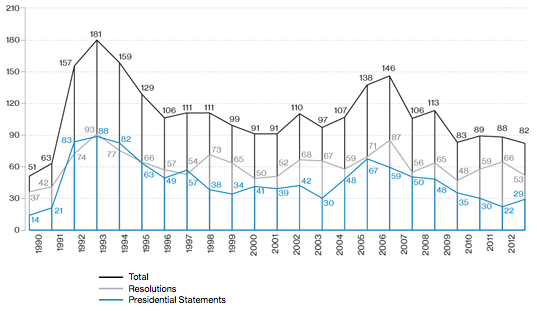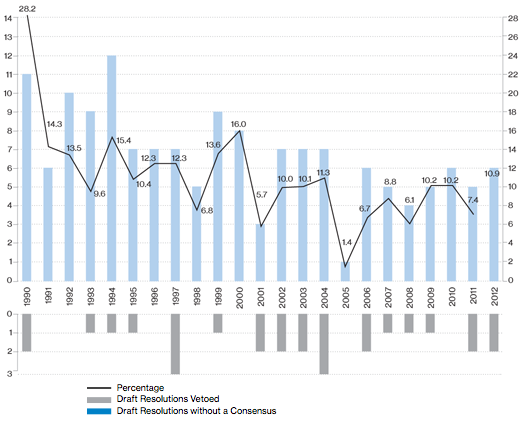Security Council Statistics in 2012

(Graph 1: Security Council Decisions)

(Graph 2: Non-Consensual Security Council Decisions)
Decreased Activity
With 53 resolutions adopted in 2012, the year saw a sharp decline (-19.7 percent) in resolutions relative to 2011 (when 66 resolutions were adopted) and a decrease in total decisions (-6.8 percent) that was attenuated by the adoption of 29 presidential statements. The increase in presidential statements (+31.8 percent), up from 22 in 2011, breaks the steady decline that began in 2005 as press statements gained added relevance. Overall, the Security Council adopted 82 decisions in 2012 compared to 88 in 2011, hitting their lowest point since 1991, when 63 decisions were adopted (see Graph 1 above).
Meetings also registered a significant decline (-15.3 percent), with the Council holding 199 in 2012, including meetings with troop-contributing countries, compared with 235 in 2011. The decision-to-meeting ratio, however, improved slightly in 2012 (0.41) relative to 2011 (0.37), as the overall decline in meetings outpaced the decrease in the number of decisions. There were, however, 174 consultations in 2012, which was slightly more than the 170 scheduled in 2011. Despite these changes, the decision-to-meeting-and-consultation ratio for 2012 remained unchanged (0.22).
Whereas two missions were established in 2011, the UN Mission in South Sudan and the UN Interim Security Force for Abyei, the Council created a single new mission in 2012, the UN Supervision Mission in Syria, which quickly expired on 19 August due to the opposition of China and Russia. While in 2011, the Council closed the UN Mission in Nepal and the UN Mission in the Sudan, it only terminated one mission in 2012, the UN Integrated Mission in Timor-Leste. Contrary to 2011, when Council members only undertook one visiting mission (Sudan, Ethiopia and Kenya from 19-26 May), 2012 saw three visiting missions (Haiti from 13-16 February; Liberia, Sierra Leone and Côte d’Ivoire from 18-24 May; and Timor-Leste from 3-6 November).
Decreased Consensus
Non-consensual resolutions were on the rise relative to 2011, as four resolutions (2058, 2063, 2068 and 2081) were adopted by a vote and two draft resolutions (S/2012/77 and S/2012/538, both on the situation in Syria) were jointly vetoed by China and Russia. Although nominally not significant because other years registered a similar or larger number of non-consensual decisions, 2012 registered the highest percentage (10.9 percent) of non-consensual decision-making by the Security Council since 2004 (see Graph 2 above). Interestingly, it was Azerbaijan that most frequently broke ranks with the majority, abstaining in three resolutions.
Breakdown by Region
As in previous years, the attention of the Council varied from region to region, with agenda items pertaining to Africa totaling 95 meetings (47.7 percent), of which 83 (41.7 percent) dealt with sub-Saharan Africa. The Council held 53 meetings (26.6 percent) on situations in North Africa and the Middle East and 48 meetings (24.1 percent) on situations in Asia (some of which are also included in the Middle East). The Council only had 18 meetings (9.0 percent) on agenda items pertaining to Europe and only five (2.5 percent) on the sole situation in the Americas (Haiti).
Relative to 2011, the year 2012 registered decreased attention to situations in Africa (-24.6 percent) and sub-Saharan Africa (-14.4 percent), increased attention to situations in Europe (+28.6 percent) and Asia (+6.7 percent), while remaining constant in regard to North Africa and the Middle East, and the Americas.
Breakdown by Agenda Item
In 2012, the Council continued to address three of the situations arising from the Arab Spring. It held ten meetings on Libya and adopted one decision (resolution 2040); nine meetings on Syria (not including meetings pertaining to the UN Disengagement Observer Force in the Golan Heights), leading to five decisions (resolutions 2042, 2043 and 2059 and S/PRST/2012/6 and S/PRST/2012/10); and four meetings and two decisions on Yemen (resolution 2051 and S/PRST/2012/8). Consideration of Libya suffered a sharp decline from 2011 (when there were 23 meetings), as expected, as the situation improved, but attention to both Syria and Yemen was on the rise relative to 2011 (when there were four meetings and one meeting, respectively). On Lebanon, there were no year-to-year changes, with two meetings and the adoption of the annual UN Interim Force in Lebanon renewal (resolution 2064). As for the “Middle East, including the Palestinian Question”, the Council continued to hold a significant number of meetings (14) without adopting a single decision.
Regarding the situations in Sudan and between Sudan and South Sudan, consideration by the Council decreased to 17 meetings in 2012 compared to 35 in 2011. Probably as a result of the lead taken by the AU Peace and Security Council in formulating the 24 April 2012 roadmap to ease the tensions between the two countries, in 2012 the Council adopted nine decisions (resolutions 2035, 2046, 2047, 2057, 2063 and 2075 and S/PRST/2012/5, S/PRST/2012/12 and S/PRST/2012/19), compared to 13 in 2011. Somalia also registered a decrease in attention from 16 to 11 meetings and from nine to seven decisions (resolutions 2036, 2060, 2067, 2072, 2073 and 2077 and S/PRST/2012/4) as the situation on the ground improved with the routing of Al-Shabaab by the AU Mission in Somalia and the swearing-in of a new national government.
As for West Africa, Council activity regarding Côte d’Ivoire was expectedly much lower in 2012, with five meetings and two decisions (resolutions 2045 and 2062) compared to 11 and seven respectively in 2011, when it had to address the post-election violence and political crisis provoked by the refusal of former President Laurent Gbagbo to concede defeat. Not surprisingly, in light of the 22 March and 12 April coups that affected Mali and Guinea-Bissau, the Council not only added Mali to its agenda but also dedicated seven and six meetings, respectively, to address the two situations and adopted five decisions on Mali (resolutions 2056, 2071 and 2085 and S/PRST/2012/7 and S/PRST/2012/9) and two decisions on Guinea-Bissau (resolution 2048 and S/PRST/2012/15). With progress continuing to build in Liberia and Sierra Leone, the Council held four and six meetings, respectively, in the run-up and follow-up to the presidential elections that reelected the incumbent presidents. It also adopted two resolutions on Liberia (2066 and 2079) and four decisions on Sierra Leone (resolution 2065 and S/PRST/2012/11, S/PRST/2012/21 and S/PRST/2012/25).
Despite the emergence of new rebel movements that threatened the Central African Republic (CAR) and the Democratic Republic of the Congo (DRC), Council attention to both situations did not increase statistically in 2012. In fact, it held exactly the same number of meetings on the DRC (eight), albeit adopting one more decision (resolutions 2053, 2076 and 2078 and S/PRST/2012/22), and met four instead of five times on the CAR or the more expansive agenda item “Central African Region”, adopting two decisions (S/PRST/2012/18 and S/PRST/2012/28) entirely unrelated to the Seleka rebellion.
Regarding the situations in Afghanistan, Haiti and Iraq, there were no significant variations in the number of meetings held relative to 2011. The Council held four meetings on Iraq and adopted one resolution (2061); five meetings on Haiti, likewise leading to one resolution (2070); and seven meetings on Afghanistan resulting in three resolutions (2041, 2069 and 2082). Council attention to Bosnia and Herzegovina and Western Sahara likewise remained unchanged with three and two meetings, respectively, leading to one resolution in each case (2074 and 2044).
The Council met twice as much as it did in 2011 on Timor-Leste, holding six meetings and adopting two decisions (resolution 2037 and S/PRST/2012/27) as it concentrated on closing UNMIT due to the achievements made since independence in 2002. In contrast, the Council met only half as much on Cyprus in 2012, scheduling two meetings and adopting one resolution (2058), and, on Burundi, held only one meeting (with no outcome) compared to three in 2011. Another agenda item without an outcome in 2012 was Kosovo, which was considered at four meetings.
On the ad hoc international tribunals, which were considered at eight meetings in 2011, the Council met six times and adopted four decisions (resolutions 2038, 2054, 2080 and 2081) as it prepared the transition to the International Residual Mechanism that will continue the functions of the International Criminal Tribunals for the former Yugoslavia (ICTY) and for Rwanda (ICTR). Finally, regarding “Non-Proliferation” in a country-specific context, there were no drastic changes, with the Council meeting five times on Iran in 2012 and adopting one resolution (2049), and twice on the Democratic People’s Republic of Korea with an equal number of decisions (resolution 2050 and S/PRST/2012/13).
The thematic agenda items suffered less variation altogether. The agenda items “Threats to International Peace and Security” and “Children and Armed Conflict” suffered no variations, each being considered at one meeting leading to one decision (S/PRST/2012/16 and resolution 2068, respectively). “Threats due to Terrorist Acts” were discussed at two meetings, as in 2011, with three decisions adopted (resolutions 2082 and 2083 and S/PRST/2012/17). The Council also met twice on “Non-Proliferation”, adopting two decisions (resolution 2055 and S/PRST/2012/14), compared to once in 2011. Whereas the Council dealt with “Peacekeeping” and “Peacebuilding” in three and two meetings, respectively, adopting one decision on the latter (S/PRST/2012/29), in 2011 it devoted four meetings to the latter and two to the former. On “Women and Peace and Security”, it met twice as much as in 2011, with four meetings at which two decisions were adopted (S/PRST/2012/3 and S/PRST/2012/23). Finally, the Council only met once each on “Protection of Civilians” and the “Rule of Law”, without any outcomes.

